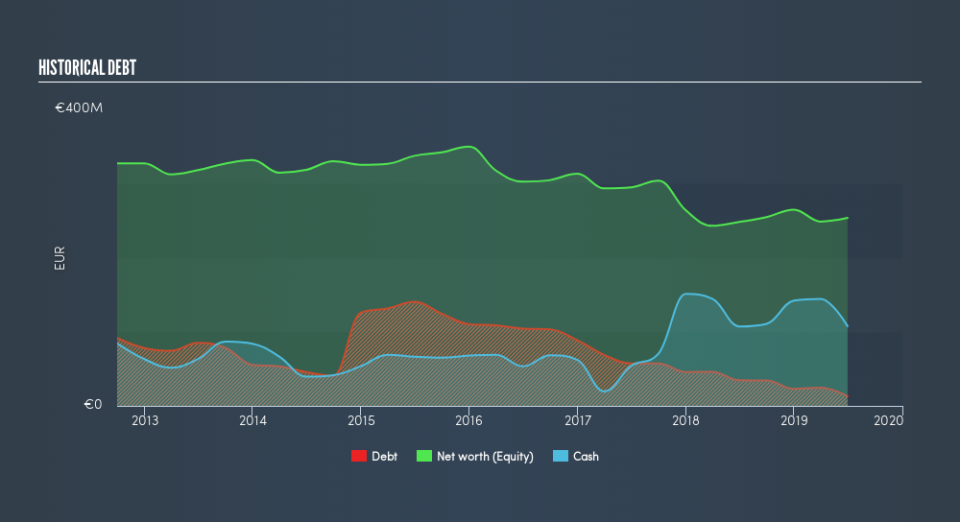Raisio (HEL:RAIVV) Has A Pretty Healthy Balance Sheet

Howard Marks put it nicely when he said that, rather than worrying about share price volatility, 'The possibility of permanent loss is the risk I worry about... and every practical investor I know worries about.' When we think about how risky a company is, we always like to look at its use of debt, since debt overload can lead to ruin. As with many other companies Raisio plc (HEL:RAIVV) makes use of debt. But is this debt a concern to shareholders?
When Is Debt Dangerous?
Debt is a tool to help businesses grow, but if a business is incapable of paying off its lenders, then it exists at their mercy. If things get really bad, the lenders can take control of the business. However, a more common (but still painful) scenario is that it has to raise new equity capital at a low price, thus permanently diluting shareholders. Having said that, the most common situation is where a company manages its debt reasonably well - and to its own advantage. When we think about a company's use of debt, we first look at cash and debt together.
Check out our latest analysis for Raisio
What Is Raisio's Net Debt?
As you can see below, Raisio had €13.0m of debt at June 2019, down from €34.5m a year prior. However, it does have €107.6m in cash offsetting this, leading to net cash of €94.6m.
A Look At Raisio's Liabilities
According to the last reported balance sheet, Raisio had liabilities of €47.3m due within 12 months, and liabilities of €6.20m due beyond 12 months. Offsetting this, it had €107.6m in cash and €33.0m in receivables that were due within 12 months. So it can boast €87.1m more liquid assets than total liabilities.
It's good to see that Raisio has plenty of liquidity on its balance sheet, suggesting conservative management of liabilities. Because it has plenty of assets, it is unlikely to have trouble with its lenders. Succinctly put, Raisio boasts net cash, so it's fair to say it does not have a heavy debt load!
Although Raisio made a loss at the EBIT level, last year, it was also good to see that it generated €25m in EBIT over the last twelve months. There's no doubt that we learn most about debt from the balance sheet. But ultimately the future profitability of the business will decide if Raisio can strengthen its balance sheet over time. So if you want to see what the professionals think, you might find this free report on analyst profit forecasts to be interesting.
Finally, a business needs free cash flow to pay off debt; accounting profits just don't cut it. While Raisio has net cash on its balance sheet, it's still worth taking a look at its ability to convert earnings before interest and tax (EBIT) to free cash flow, to help us understand how quickly it is building (or eroding) that cash balance. In the last year, Raisio's free cash flow amounted to 43% of its EBIT, less than we'd expect. That weak cash conversion makes it more difficult to handle indebtedness.
Summing up
While it is always sensible to investigate a company's debt, in this case Raisio has €95m in net cash and a decent-looking balance sheet. So is Raisio's debt a risk? It doesn't seem so to us. Given Raisio has a strong balance sheet is profitable and pays a dividend, it would be good to know how fast its dividends are growing, if at all. You can find out instantly by clicking this link.
If you're interested in investing in businesses that can grow profits without the burden of debt, then check out this free list of growing businesses that have net cash on the balance sheet.
We aim to bring you long-term focused research analysis driven by fundamental data. Note that our analysis may not factor in the latest price-sensitive company announcements or qualitative material.
If you spot an error that warrants correction, please contact the editor at editorial-team@simplywallst.com. This article by Simply Wall St is general in nature. It does not constitute a recommendation to buy or sell any stock, and does not take account of your objectives, or your financial situation. Simply Wall St has no position in the stocks mentioned. Thank you for reading.



